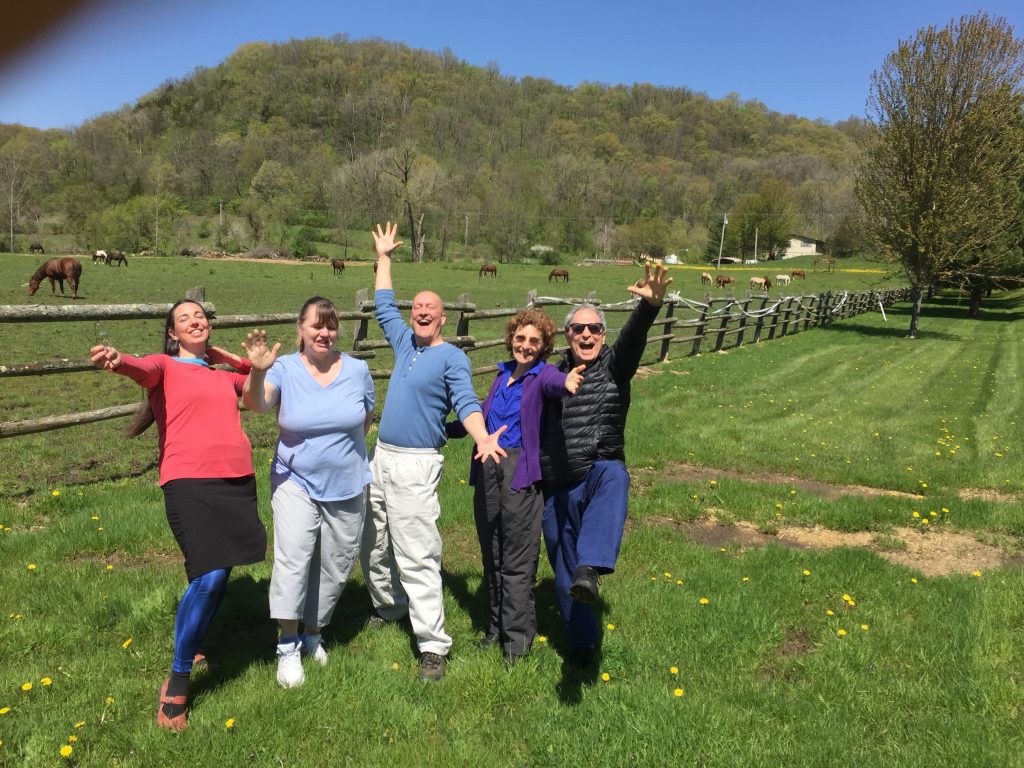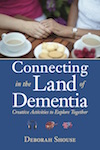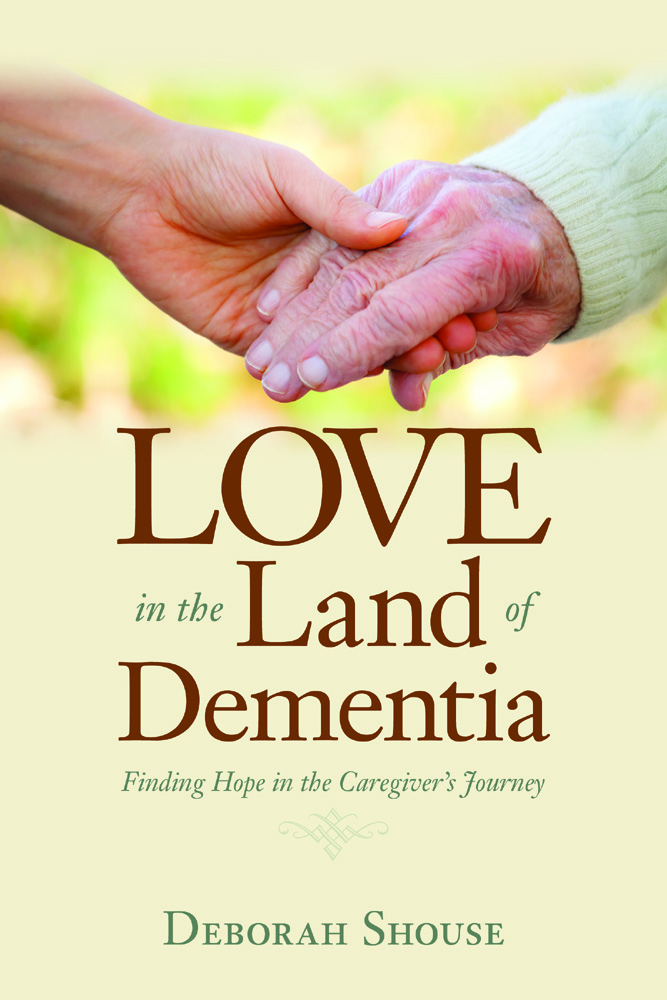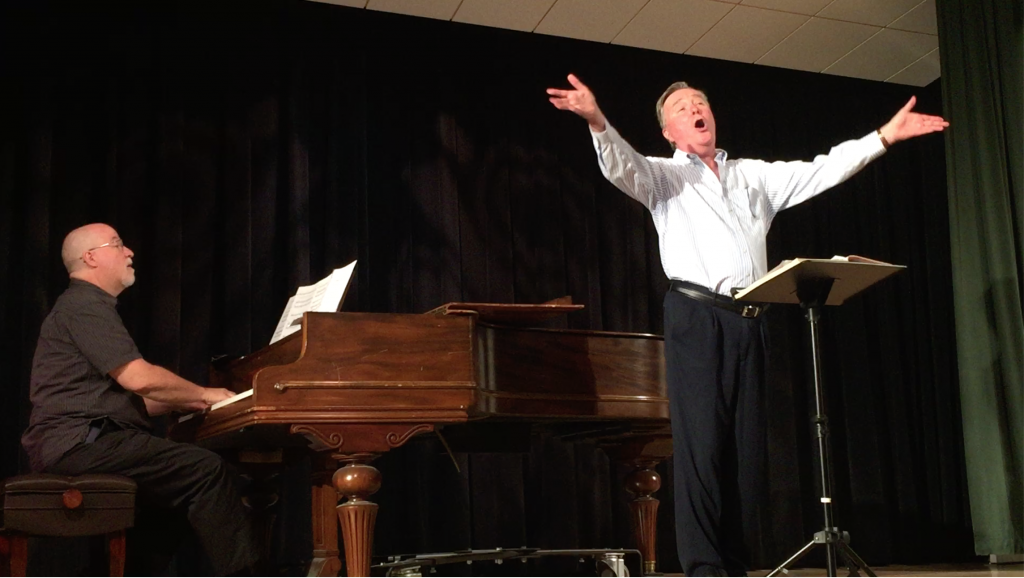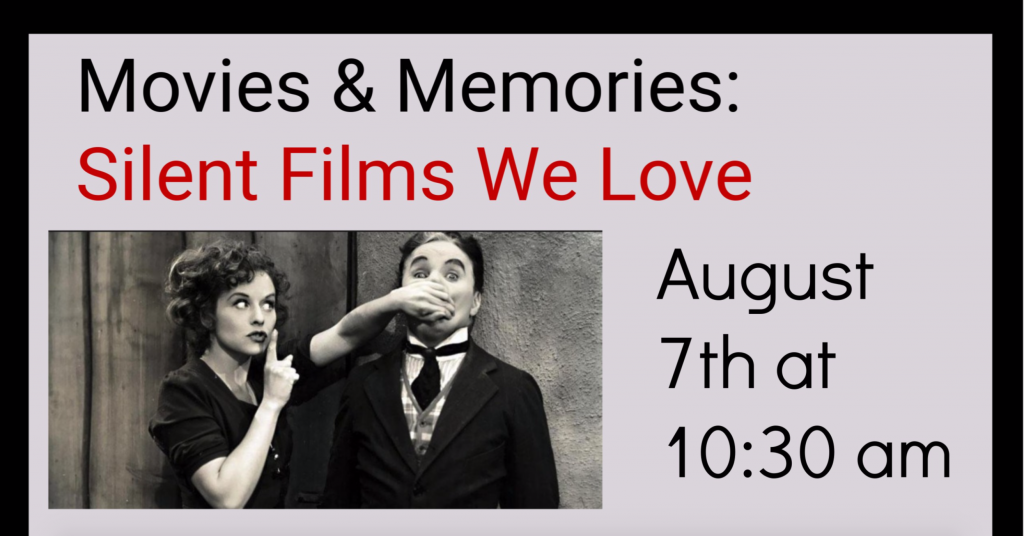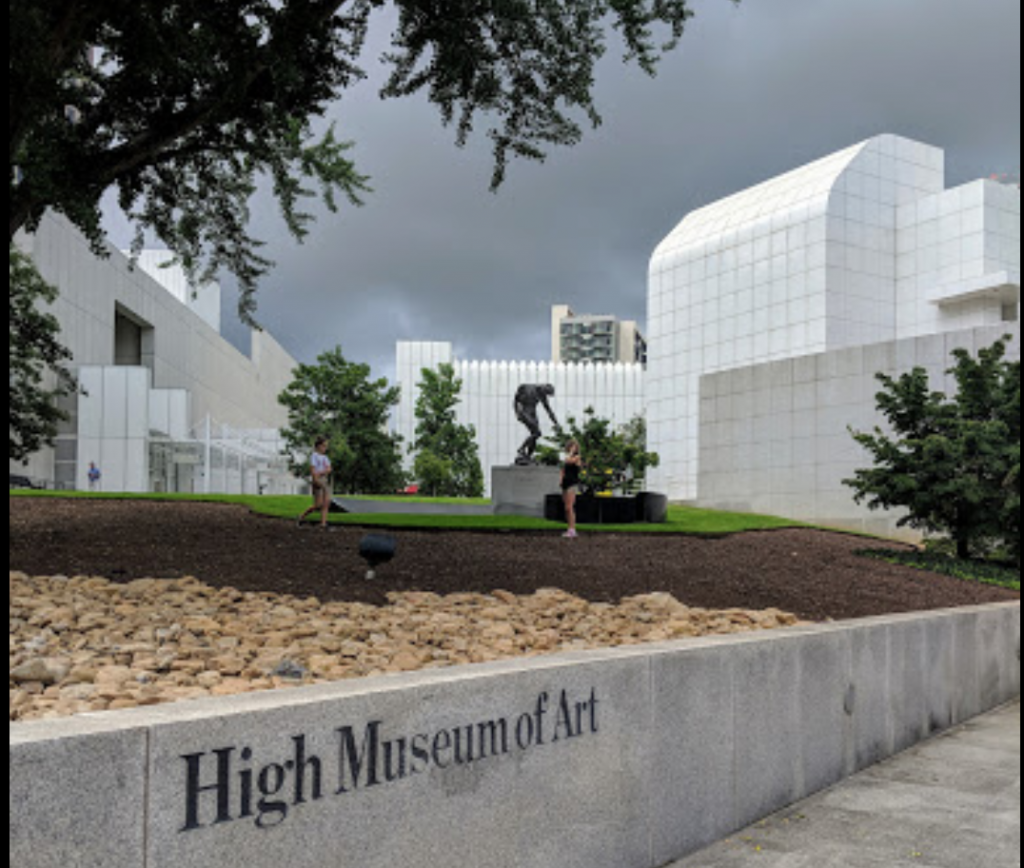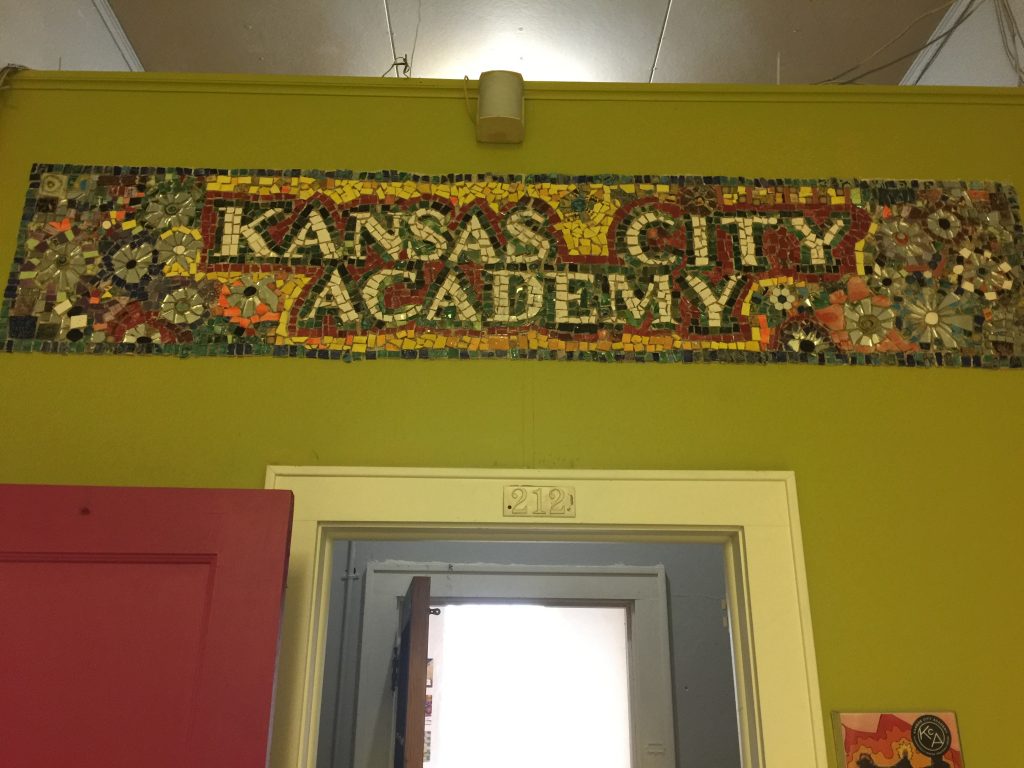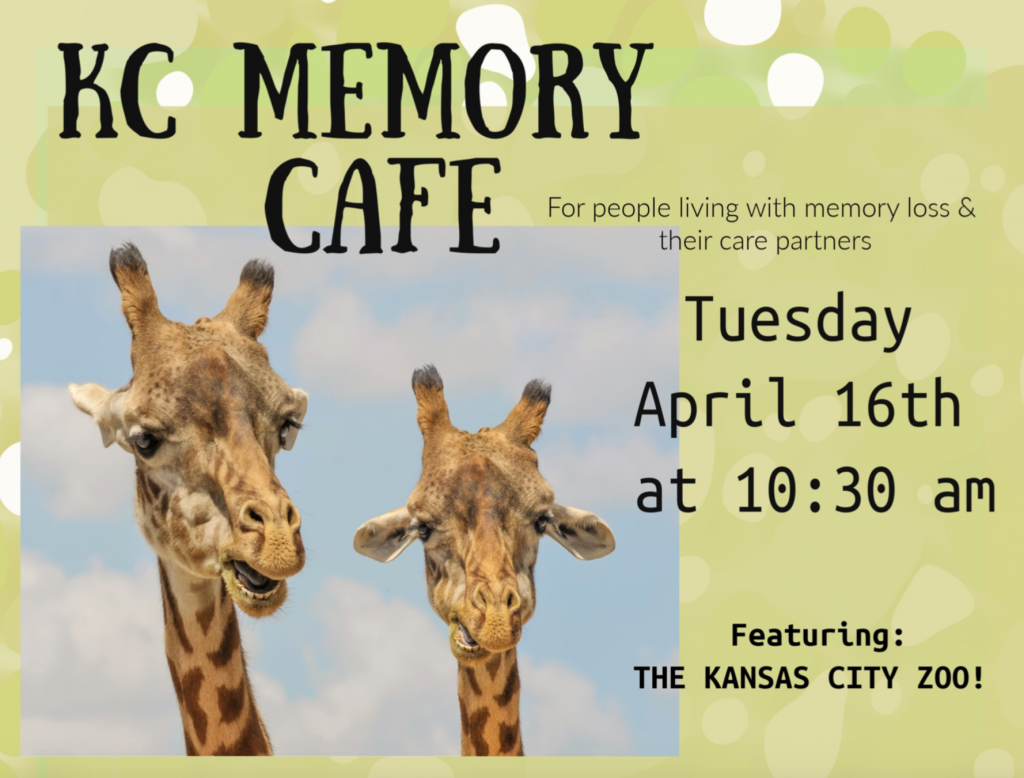Care Partnering
Laughing All the Way: Boosting Health and Happiness
“When You Laugh, you change,
and when you change the whole world changes.”
-Dr Madan Kataria, MD, Founder Laughter Yoga Movement
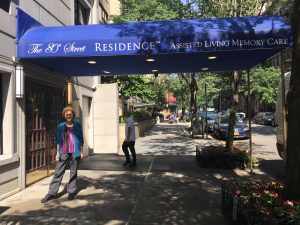 We were warmly welcomed into a parlor area, reminiscent of an elegantly aging aunt’s apartment. A piano waited patiently along one wall. There was a colorful bowl of fruit and a tempting array of pastries and fruit-infused waters. As we waited, we looked out into an outdoor garden and picnic area. The 80th Street Residency, a memory care community in Manhattan, created a warm, home-like atmosphere for its residents. Ron and I had come here to offer a laughter yoga class, hoping to boost our participants’ health and happiness. We worked with their activities coordinator, Jackie LaBau.
We were warmly welcomed into a parlor area, reminiscent of an elegantly aging aunt’s apartment. A piano waited patiently along one wall. There was a colorful bowl of fruit and a tempting array of pastries and fruit-infused waters. As we waited, we looked out into an outdoor garden and picnic area. The 80th Street Residency, a memory care community in Manhattan, created a warm, home-like atmosphere for its residents. Ron and I had come here to offer a laughter yoga class, hoping to boost our participants’ health and happiness. We worked with their activities coordinator, Jackie LaBau.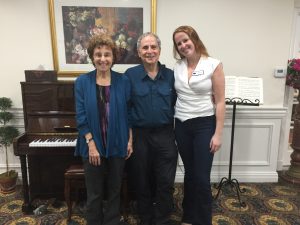
Here’s what we’ve learned about laughter yoga: often people look, act, and feel differently after they’ve experienced a session. There is a magic about intentionally laughing with a group. The experience of breathing, clapping, engaging in playful imaginings, and of course, laughing, soon softens the spirits. People feel energetic and connected. Everyone, including staff, residents, and us, leave feeling happier. That’s what happened in New York, just as it has every time Ron and I have led laughing sessions.
Back home in Kansas City, we laughed with the lively people at Jeanne’s Place, CareHaven’s day program for people living with early stage dementia. We have laughed with these wonderful folks before, and now they start giggling when we walk in.
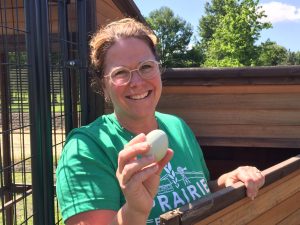 We also visited Mandy Shoemaker and her team at Prairie Eider Care, our area’s only Eden Alternative homes, and we had fun admiring their outdoor barnyard collection of silky chickens, a potbellied pig, and sassy ducks. Then we settled into their welcoming living areas. We sat in intergenerational circles with staff, family members, and residents, talking, singing, and laughing.
We also visited Mandy Shoemaker and her team at Prairie Eider Care, our area’s only Eden Alternative homes, and we had fun admiring their outdoor barnyard collection of silky chickens, a potbellied pig, and sassy ducks. Then we settled into their welcoming living areas. We sat in intergenerational circles with staff, family members, and residents, talking, singing, and laughing.
Dr. Kataria, the founder of Laughter Yoga, believes that inviting out our childlike energy and acting playfully is vital to living a balanced and healthy life. Plus, it’s tremendous fun. He says: “Laughter Yoga is an aerobic workout that helps uplift your mood within minutes by releasing endorphins from your brain cells. You often remain energized, relaxed, and in good spirits throughout the day. Laughter also makes our immune system stronger, increases oxygen intake, and reduces stress. Plus laughing with others builds a social bond and reduces feelings of isolation.”
In our groups, we created laughter milkshakes, with each person choosing their favorite flavor of ice cream. We looked at each other, waved, and laughed. We had a lot of dog lovers in our groups, so we imagined how a chihuahua would laugh. A member of the nursing team loved large dogs and she helped us to guffaw like a Great Dane. Most of our group loved baseball, so we sang, “Take Me Out to the Ballgame,” then substituted the words with “Ha Ha “ syllables, otherwise known as the Ha Ha Chorus. That chorus works for any familiar song and tickles your funny bone.
Ron and I learned Laughter Yoga from the amazing Robert Rivest, who is a master 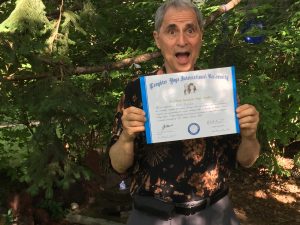 trainer and who studied with Dr. Kataria. But you don’t need to be a trained facilitator to bring more laughter into your life.
trainer and who studied with Dr. Kataria. But you don’t need to be a trained facilitator to bring more laughter into your life.
Quick Tips for Adding Laughter into the Day
•Look at the clock and laugh for one minute.
•When driving, laugh during red lights.
•When working out, pick a couple of exercises, such as squats and curls, and laugh while you’re doing them. (Want to get others laughing? Do this at the gym!)
•Use the “ha ha chorus” to bring giggles into your life. Take any song and substitute “ha ha ha’s” for the words. This works well in the shower, car, on walks and more.
Want to laugh more?
Visit laughteryoga.org and robertrivest.com
Contact Deborah Shouse and Ron Zoglin: 816-361-7878 Email myinfo@pobox.com Website: DemeniaJourney.org
If you are part of a memory care community in the KC area and you’d like to gift your residents with laughter, feel free to reach out to us at creativity@pobox.com
Click to view informative and inspiring short videos on our YouTube channel
Deborah Shouse is the author of Connecting in the Land of Dementia: Creative Activities to Explore Together and Love in the Land of Dementia: Finding Hope in the Caregiver’s Journey.
Some Enchanted Beautiful Morning: Movies & Memories Celebrates Inclusion
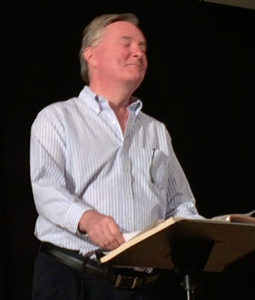 The buzz of conversation ceased as singer/actor Robert Gibby Brand stepped up to the microphone. His accompanist, pianist Robert Pherigo, played the opening bars of Oh, What a Beautiful Morning and Brand soared into the “Bright golden haze on the meadow.” Instantly the audience, ages two to 85 plus, was listening raptly. Brand continued his concert, inviting us to sing along on It’s a Long Way to Tipperary, and melting us with the Cole Porter classic Night and Day. Brand told us the story behind each song and left us wildly applauding after performing Some Enchanted Evening. It was some enchanted beautiful morning at the monthly KC Movies & Memories program.
The buzz of conversation ceased as singer/actor Robert Gibby Brand stepped up to the microphone. His accompanist, pianist Robert Pherigo, played the opening bars of Oh, What a Beautiful Morning and Brand soared into the “Bright golden haze on the meadow.” Instantly the audience, ages two to 85 plus, was listening raptly. Brand continued his concert, inviting us to sing along on It’s a Long Way to Tipperary, and melting us with the Cole Porter classic Night and Day. Brand told us the story behind each song and left us wildly applauding after performing Some Enchanted Evening. It was some enchanted beautiful morning at the monthly KC Movies & Memories program.
But the enchantment didn’t stop there. First we watched the Oscar nominated short, 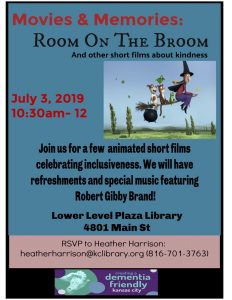 Room on the Broom, which illustrated the joys and challenges of inclusion in a most creative, playful, and poignant way.
Room on the Broom, which illustrated the joys and challenges of inclusion in a most creative, playful, and poignant way.
One of the characters said plaintively, “I am a bird, as green as can be. Is there room on the broom, for a bird like me?” The witch’s clingy cat captured that part in most of us that doesn’t want to share, that believes there is not enough. But the witch reminded us, “Yes, there is room.”
Afterwards we discussed the movie, asking who identified with the clingy cat. All of us had to raise our hands. Then we asked who identified with the witch, who welcomed everyone, and there was a large showing of hands. We also talked about favorite characters and what parts of the film we liked best.
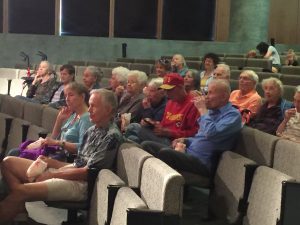 To finish our mini film-fest, we played an inspiring clip from a Mr. Rogers show, and showed Purl, an 8-minute Pixar film, about how our differences can enrich our lives.
To finish our mini film-fest, we played an inspiring clip from a Mr. Rogers show, and showed Purl, an 8-minute Pixar film, about how our differences can enrich our lives.
It was an inspiring program and everyone left uplifted and delightfully sated by our fresh-made popcorn and other treats.
For a taste of Some Enchanted Beautiful Morning, click here.
A big thanks to our volunteers, Sharon, Julie, and Pam, and to our generous hosts, The Plaza Library.
Want to continue the magic at home?
Room on the Broom is a 20-minute film that is fun for all ages, while being both entertaining and profound. You can easily generate open-ended questions and invite comments and conversation. We talked about, “If you were an animal, which animal would you like to be?” “Who did you identify with?” “What were your favorite parts of the movie?” “Have you ever not wanted to share?”
Want to continue the magic with us? Mark your calendars for the first Wednesday of each month at 10:30. Please join us for our next cafe and our next movie program. For more information, contact Deborah at creativity@pobox.com
Click to view informative and inspiring short videos on our YouTube channel
Deborah Shouse is the author of Connecting in the Land of Dementia: Creative Activities to Explore Together and Love in the Land of Dementia: Finding Hope in the Caregiver’s Journey.
Upcoming KC Dementia Friendly Events
Please join us for these upcoming KC Dementia Friendly events, specially created for people who are living with dementia and their family, friends, and care partners.
All are welcome.
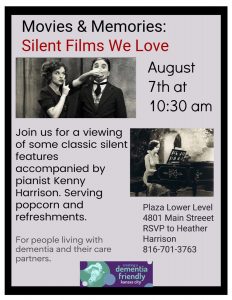
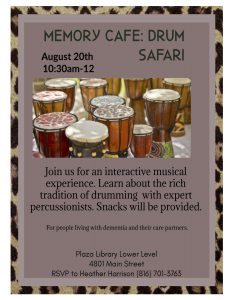
Click to view informative and inspiring short videos on our YouTube channel
Deborah Shouse is the author of Connecting in the Land of Dementia: Creative Activities to Explore Together and Love in the Land of Dementia: Finding Hope in the Caregiver’s Journey.
Musing Together: Looking at Art Expands Skills, Increases Socialization, and Widens Horizons
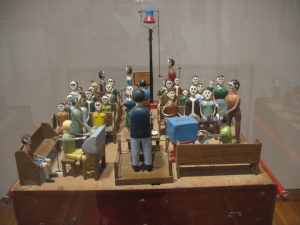 The group pauses in front of a large contemporary sculpture, depicting a preacher standing before his congregation at a small country church. They walk around the piece, noticing the pews, the organist, and the variety of parishioners, and chatting as they view. Then they settle into chairs and co-facilitator Esther Smith asks: “What is one word that comes to mind when you look at this piece of art.”
The group pauses in front of a large contemporary sculpture, depicting a preacher standing before his congregation at a small country church. They walk around the piece, noticing the pews, the organist, and the variety of parishioners, and chatting as they view. Then they settle into chairs and co-facilitator Esther Smith asks: “What is one word that comes to mind when you look at this piece of art.”
“Boring,’ says one woman.
“What makes it boring?” Esther asks.
“It brings me back to my childhood, when I was stuck in church for hours,” she answers. “I was so bored.”
A few others nod. Someone asks, “When was this made? Where is it from?” and the conversation about the art continues.
Every month at the High Museum in Atlanta, Georgia, Teaching Artist Esther Smith guides a group of care partners and people living with dementia on a 90-minute gallery exploration called Musings Together.
“It’s a light-hearted, interactive experience,” Esther says. “We go at a slow pace, seeing only three to four works each time. We want people to have a comfortable, personalized experience with art.”
 The open-ended conversation brings out people’s stories and ideas. Sitting in front of Giovanni Bellini’s Madona and Child, Esther asks, “What lines do you notice in this painting? Trace them in the air with your hand.”
The open-ended conversation brings out people’s stories and ideas. Sitting in front of Giovanni Bellini’s Madona and Child, Esther asks, “What lines do you notice in this painting? Trace them in the air with your hand.”
After people trace their lines, she asks, “What line was most interesting to you?” That question might lead into a discussion of what makes this painting different. Then Esther might invite the group to pose like the picture. She might say, “How would that baby’s head feel in your hand?”
“These simple prompts launch us into deep conversations,” Esther says. She and her team are experimenting with expanding the sensory experience, including bringing out oranges when they’re gazing at a still life of fruit and letting each guest hold and examine the orange. Esther also invites people to occasionally sketch an aspect of a drawing that appeals to them, using a drawing pad on a clipboard.
“ A number of our participants have never been regular museum-goers. Now they feel comfortable here and come more often,” Esther says. “Developing a new community of friends and an expanding interest in art enriches their lives.” #
Want to look at art with someone who is living with dementia?
If you’re visiting a museum, focus on a gallery with 3-4 large and interesting pieces. Ask a docent for advice, if needed. If you’re at home, give yourself plenty to time to comfortably view a few works of art on-line or in books.
- Bring a folding chair, so you can sit.
- Chose a time of day when your partner is energetic and the gallery is relatively quiet.
- Have fun just noticing the aspects of the piece. You might invite comments on colors, textures, familiar figures, objects that seem odd to you, and other aspects.
- Ask open-ended questions, such as, “What does this piece make you think of?” “What do you like about this piece?” “How do you think that main guy feels?”
When attention wanes, move onto something else, including a lovely coffee or tea break.
Click to view informative and inspiring short videos on our YouTube channel
Deborah Shouse is the author of Connecting in the Land of Dementia: Creative Activities to Explore Together and Love in the Land of Dementia: Finding Hope in the Caregiver’s Journey.
A Dream Came True at The Red Ballon Movies & Memories
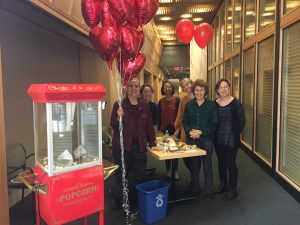 “I wish I had a red balloon,” one of our guests said, after the inspiring ending of the short film, The Red Balloon. Moments later, the dream came true. Each guest was offered a buoyant scarlet balloon, the magical symbol of a meaningful film.
“I wish I had a red balloon,” one of our guests said, after the inspiring ending of the short film, The Red Balloon. Moments later, the dream came true. Each guest was offered a buoyant scarlet balloon, the magical symbol of a meaningful film.
The Movies & Memories program now has a new time and date: the first Wednesday of each month from 10:30-12:00.
As guests enter the lower level of the 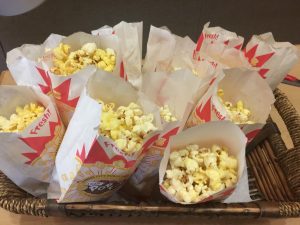 Plaza Library, they breathe in the enticing aroma of fresh popcorn. Soon, they are settled in comfortable chairs and munching on popcorn and cookies, while being serenaded. They sing along with Richelle Basgall, who engages them with fiddle, guitar, kazoo, and more. They tap their feet and clap their hands, belting out favorite folk songs and old standards, such as Ol’ Suzanna, Que Sera Sera, and I’ve Been Working on the Railroad.
Plaza Library, they breathe in the enticing aroma of fresh popcorn. Soon, they are settled in comfortable chairs and munching on popcorn and cookies, while being serenaded. They sing along with Richelle Basgall, who engages them with fiddle, guitar, kazoo, and more. They tap their feet and clap their hands, belting out favorite folk songs and old standards, such as Ol’ Suzanna, Que Sera Sera, and I’ve Been Working on the Railroad.
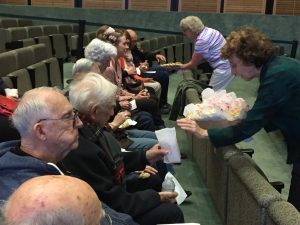 Then the lights lower and everyone watches intently as a young boy and his red balloon form a deep bond, and stick together, despite many obstacles. People were still talking about the movie as they and their balloons trail down the hallway, heading towards home.
Then the lights lower and everyone watches intently as a young boy and his red balloon form a deep bond, and stick together, despite many obstacles. People were still talking about the movie as they and their balloons trail down the hallway, heading towards home.
Get a taste of The Red Balloon movie event by clicking here.
Many thanks to our wonderful volunteers, including Sharon, Julie, and Pam. And special thanks to Sharon and Elizabeth from Stonecrest for bringing delicious snacks for us.
Our next movie experience is on July 3rd. Please join us for Room on the Broom, and other short films, a celebration of diversity. You’ll love the songs from Robert Gibby Brand, our featured musician.
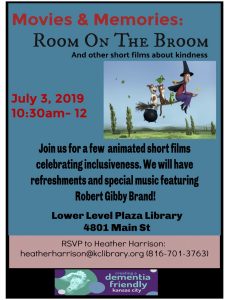
Click to view informative and inspiring short videos on our YouTube channel
Deborah Shouse is the author of Connecting in the Land of Dementia: Creative Activities to Explore Together and Love in the Land of Dementia: Finding Hope in the Caregiver’s Journey.
Let’s have a ball together
We hope you can join us for one or both of these fascinating free events.
Please share with those who might benefit:
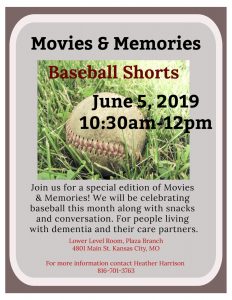

Talking about Dementia with Teens
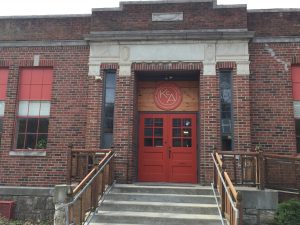 We were delighted to spend time with the bright and curious sixth and seventh graders in Mary Silwance’s class at KC Academy. They had read the young adult novel Hour of the Bees, which features a poignant relationship between a pre-teen girl and her grandfather who is living with dementia, and they wanted to learn more. During our short time together, talking about dementia with teens, we discussed:
We were delighted to spend time with the bright and curious sixth and seventh graders in Mary Silwance’s class at KC Academy. They had read the young adult novel Hour of the Bees, which features a poignant relationship between a pre-teen girl and her grandfather who is living with dementia, and they wanted to learn more. During our short time together, talking about dementia with teens, we discussed:
- How it might feel for people who are living with dementia
- Stigma and stereotypes
- Creativity and dementia
- Becoming an advocate
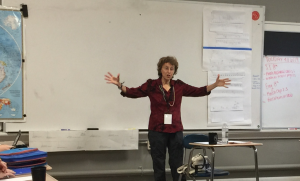 Here are a few excerpts from our lively conversation:
Here are a few excerpts from our lively conversation:
How many of you have ever misplaced something? How did you feel when you couldn’t find it?
How many of you have ever forgotten what you were going to say?
Have any of you ever overslept, woken up in a panic, and not known what day it was?
Those kinds of issues happen to most of us, at least occasionally.
But imagine how you would feel if they started happening all the time. You kept misplacing your cell phone, your homework, your library books. You couldn’t remember your address or your teacher’s name. What if you raised your hand to answer a question at school and the words you were going to say just disappeared. Or they came out all jumbled up? What if it happened so often that you started to worry about talking and became more and more quiet?
These are a few of the things that people who are living with dementia have to cope with.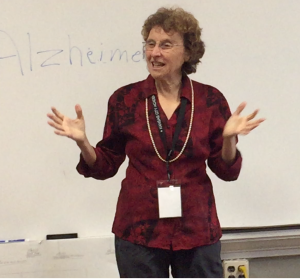
With most illnesses, people cluster around and want to help you. But some people with memory loss actually lose their friends. We know dementia is not contagious, so why would people shy away?
People are scared when their friends and family members start changing. They’re worried they won’t know what to say or how to communicate. They’re worried about making a mistake. But the only mistake is abandoning a person you care about.
Lots of people are working together to make life better for those who are living with dementia. And some are those are people who are living with dementia. They say, “Nothing about us without us,” which means, “Don’t make plans about our lives without consulting us.”
How you can be an advocate
- Watch your language. Don’t use the words victim or sufferer with Alzheimer’s or dementia. These are strong and courageous people dealing with a brain disease.
- Look for opportunities to spend time with people who are living with dementia.
- Don’t worry if you don’t know what to say. Look at the person. If they’re in a wheelchair or chair, bend or kneel so you can have eye contact.
- Try to find a quiet place to talk and listen. Some people are overwhelmed by too much noise.
- Remember to slow down because some people need extra time to answer questions.
- Seek ways to connect through arts and imagination, including music, drawing, cooking, gardening, and flower arranging.
Click here to experience part of the conversation
Click to view informative and inspiring short videos on our YouTube channel
Deborah Shouse is the author of Connecting in the Land of Dementia: Creative Activities to Explore Together and Love in the Land of Dementia: Finding Hope in the Caregiver’s Journey.
Animal Magnetism: The Zoo Cafe Attracts Almost 100 People!
The April 16th KC Memory Cafe started out quietly. People came in, silent, perhaps feeling a little confused or weary. After they sat down at comfortable tables and were served comforting snacks, the conversations increased. People enjoyed their oranges, animal crackers, and drinks. And then the dynamic duo from the Kansas City Zoo brought out the first attraction and the crowd got really engaged in the black and bright blue tree frog from South America. They peered through the glass container at the amphibian, tapped the glass to get his attention, and asked questions. The animal magnetism was working. 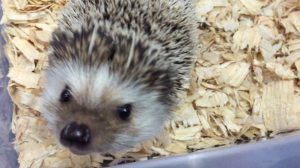
With the introduction of the African Pygmy Hedgehog, the guests became even more animated. The hedge hog was undeniably adorable and everyone wanted a good look. “Where is he from?” “What does he eat?” “Will he bite?” people asked. And “Can I have another look at him?”
When the parrot emerged from its covered cage, everyone grinned and clapped. The bird wowed the crowd by saying, “Hello,” clear as could be. When one of the educators passed around brilliantly colored feathers the parrot had shed, people avidly admired them. 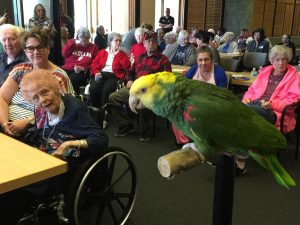
The energy was buzzing as people left, buoyed by learning about these new animals and excited by the outing.
“I will be back,” one woman promised.
“This was so well done,” a staff member told us.
“I loved the parrot,” another woman said.
What we all loved most was seeing our guests blossom and talk and come to life by experiencing such an interactive and engaging program. Many thanks to the Kansas City Zoo for sharing these remarkable educators and animals with us. And many thanks to our guests for attending. We hope to see you all at a future cafes.
Click here and enjoy watching the animal magnetism
Want to experience some animal magnetism at home?
If you have a pet, share the responsibilities of caring for it. Taking care of an animal offers a sense of purpose and invites out our nurturing spirits.
If you don’t have your own pet, invite a well behaved pet to visit. Select an animal you all like, ideally one you can pet and hold, such as a dog, cat, or bunny.
Consider adding a spill-proof aquarium, featuring brightly colored fish. Watching the fish glide by can be soothing.
Look for other opportunities to hold or connect with animals.
Come join us for our next Cafe:
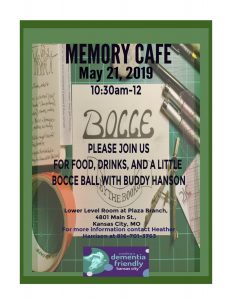
Free events for people living with dementia and their care partners
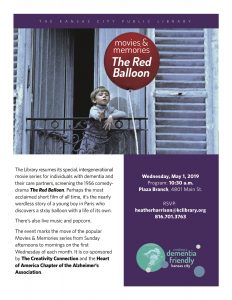
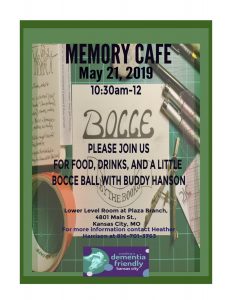
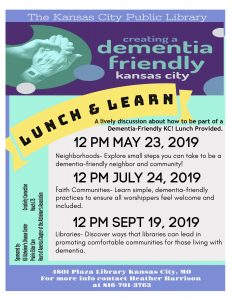
Quality Moments in the Land of Dementia: Laughing and Creativity in Jamaica
Our hosts started the program with a beautiful hymn of gratitude, a perfect way to acknowledge the spiritual aspects of connecting and laughing in the land of dementia. We met in the Salvation Army Church and Community Centre in historic downtown Falmouth, Jamaica, with a group of caregivers and community advocates. During our time together, we shared stories, information, laughter exercises, and creative ideas for taking care of ourselves and staying engaged.
 For many, this was an introduction to dementia. For others, who were in the midst of caregiving, this was a time of learning and sharing.
For many, this was an introduction to dementia. For others, who were in the midst of caregiving, this was a time of learning and sharing.
Ron and I talked about the importance of accepting each other as we are, no matter what we are going through. We discussed the power of having a purpose and how vital it is for all of us to have meaningful relationships and interesting experiences. .
”When communicating with people who are living with dementia, don’t argue,” Shirley Duncan reminded everyone. “Don’t criticize. Be there to support and appreciate.”
“When we are kind to ourselves, then we are better able to be kind to others,” one of our attendees said.
We discussed Dr. Cameron Camp’s concept of cognitive ramps, offering people the assistance they need 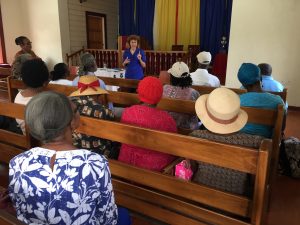 to remain engaged in the activities they love. Here’s one example from our session: Lorna’s mother was a professional cook, completely at home in the kitchen. As her dementia progressed, she could no longer remember the family’s favorite recipes. But she could sit in the kitchen and enjoy the energy of cooking. And when Lorna’s daughter said, “We are going to make your famous stew. Does it have an onion in it?” the mother smiled and nodded. Ingredient by ingredient, they consulted her, and she smiled and nodded at the mention of the right ingredients. Even though she wasn’t physically creating the meal, she was an integral part of the process.
to remain engaged in the activities they love. Here’s one example from our session: Lorna’s mother was a professional cook, completely at home in the kitchen. As her dementia progressed, she could no longer remember the family’s favorite recipes. But she could sit in the kitchen and enjoy the energy of cooking. And when Lorna’s daughter said, “We are going to make your famous stew. Does it have an onion in it?” the mother smiled and nodded. Ingredient by ingredient, they consulted her, and she smiled and nodded at the mention of the right ingredients. Even though she wasn’t physically creating the meal, she was an integral part of the process.
We talked about the power of music, sharing ideas from Dan Cohen’s Music and Memory program and introduced people to the personal playlist. We had an impromptu Conductorcise session, using Maestro David Dworkin’s aerobic and ground-breaking program, pretending we were conducting a symphony orchestra. We used laughter syllables to make it even more fun and soon everyone was standing up and conducting and laughing.
We shared a story from Karen Stobbe, reminding us all to affirm and appreciate and to use the improv technique, “Yes and…” to ignite and invite conversation.
Throughout our discussion, we wove in laughter exercises.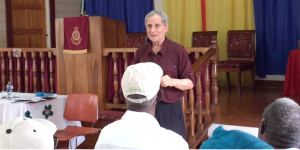
We enjoyed an imaginary laughter swim. We batted around laughter balloons and cooked up a laughter stew that included fish, pumpkin, garlic, carrots, Irish potatoes and okra.
At the end, we breathed in our gratitudes, closed our eyes and sent our feelings of love, connection, and laughter into the world, hopefully to help and inspire others.
Click here for a small taste of this lively workshop:
A special thanks for the dementia advocates and community volunteers who brought everything together, including Dundeen Ferguson, Shirley Duncan, Sandra Latibeaudiere, Elise Thomas, and Lorna Colley. And thanks to everyone who attended.
Deborah Shouse is the author of Connecting in the Land of Dementia: Creative Activities to Explore Together and Love in the Land of Dementia: Finding Hope in the Caregiver’s Journey.
